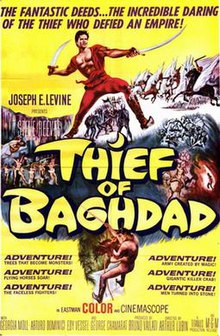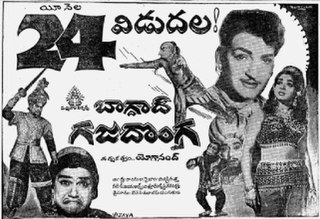Plot
In the time of the Arabian Nights, the city of Baghdad was ruled by Sultan Ali Bajazeth but actually controlled by the scheming Grand Vizier Ghamal. The poor of Baghdad are aided by Karim, the Thief of Baghdad.
Prince Osman is due to arrive at the palace to ask for the hand of Sultan Ali's daughter Amina in marriage. Karim sneaks into the palace, waylays Osman, and impersonates the prince, using the opportunity to steal jewels from all of the assembled courtiers. When this is discovered, Karim hides in Princess Amina's quarters. When her attendants leave, Karim reveals himself to her, and the two are immediately drawn to each other (she believes that he is Prince Osman). The following night, Karim secretly returns to the palace. He meets with Amina, and they declare their love for each other. Climbing down into a courtyard to escape the guards, he lands in the middle of a group of prisoners condemned to slavery in the Desert Mills and is dragged off with them.
Ghamal gives Osman a potion to make Amina fall in love with him, but she falls dangerously ill after drinking it. An old man appears and says that the only way Amina can be cured is for her to be given a blue rose by someone who truly loves her and whom she truly loves. The blue rose can only be found by passing through the Seven Doors. The sultan proclaims that the quest for the blue rose is open to all.
At the Mills, Karim learns of Amina's illness and escapes. Returning to Baghdad, he is told by the old man about the quest. He tries to join the assembled suitors but is recognized. Karim steals a horse and sets off.
The suitors make camp for the night. Karim camps nearby and slips into the camp to steal food and water. Osman secretly slits the waterbags of the other suitors.
The next day, the other suitors are beginning to die of thirst. Karim shares his water with them, and the First Door appears. They ride through and find themselves in a forest. That night, the trees come to life and attack them. Most of the suitors flee, but Karim uses a torch to fight off the trees, after which the Second Door appears. It leads to a plain of sulphurous geysers that erupt into a ring of fire. Karim realizes that this is an illusion and uses a rock to smash through, finding the Third Door.
The Third Door leads to the Palace of Kadeejah, a beautiful woman who tempts Karim to give up the quest and remain with her. Karim realizes that Kadeejah and her palace are a trap and finds the Fourth Door in a seaside cave. Meanwhile, Osman attacks Baghdad, and Ghamal turns traitor and joins Osman.
The Fifth Door leads Karim to a winged horse, on which he travels to a castle in the clouds, where he finds the blue rose. He is immediately transported back to the desert, where the old man is waiting with Karim's horse. The man gives Karim a magic jewel, telling him it will grant him one wish.
Osman demands that Sultan Ali surrender Baghdad, threatening Amina. Karim arrives and uses the magic jewel to create an army of Karims, which, armed only with clubs, defeats Osman and his army. Unfortunately, during the battle, Osman's sword destroys the Blue Rose. Osman and his army flee.
Karim rescues Amina and returns her to her father. The Blue Rose is destroyed, but Karim plucks a white rose and gives it to Amina, telling her that if she truly loves him, then it is blue. She takes the rose and tells him that it is blue, and it immediately turns blue, curing her. The sultan welcomes Karim as his son-in-law and successor. Karim sees a bust of the mysterious old man, but the sultan tells him that it is a bust of his late uncle, the great Sultan Achim I.


















